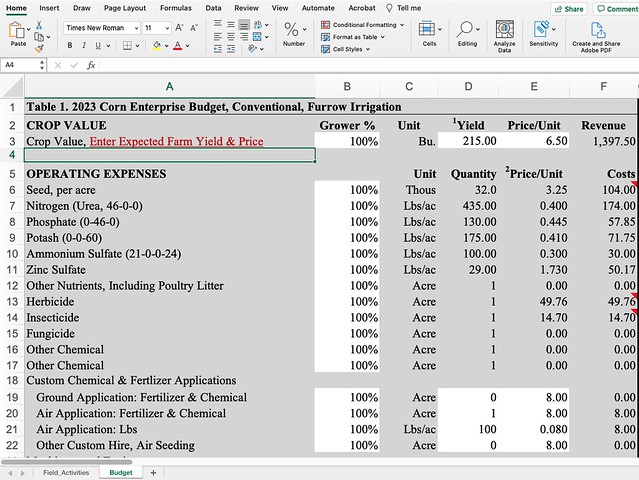Enterprise budgets available to help Arkansas farmers plan for 2023
“This year we’ve seen a lot of correction in input supply issues which has allowed the volatility in prices to wane from the 2022 budgets.” — Breana Watkins
By Mary Hightower
U of A System Division of Agriculture
Nov. 16, 2022
Fast facts:
- 2023 planning tools available online
- Mississippi River levels could still prove tricky through winter
- Farmers with questions can contact author directly bjwatkins@uada.edu
(351 words)
(Newsrooms: with mainbar: ark-low-mississippi-river-prices; screenshots of sample budget spreadsheets)
JONESBORO, Ark. — The 2023 enterprise budgets, an important tool to help farmers plan their next crop season mix, contain changes that reflect some of the biggest economic impactors from the current year, said economist and author Breana Watkins.
The enterprise budgets, compiled annually for corn, cotton, grain sorghum, peanuts, rice, soybeans and wheat, are available online.
“This year we’ve seen a lot of correction in input supply issues which has allowed the volatility in prices to wane from the 2022 budgets,” she said. “A slight correction in the costs of fertilizer and chemicals has been offset by an increase in diesel fuel costs as well as a decrease in local cash bids on grain.
“We are still holding on to profitable levels but the situation with the Mississippi River is one that can greatly impact this,” Watkins, an extension economist for the University of Arkansas System Division of Agriculture, said. “Even flooding fields for waterfowl this winter could create major delays and issues with navigating the river for the upcoming planting season.”
She said that “without a wet winter to replenish the water tables, this spring could be a bit tricky when it comes to buying needed fertilizers and for selling any grain held in bins.”
In 2022, Watkins had to make some significant adjustments to the enterprise budgets because of a list of global issues that included how drought-related power-rationing has hindered glyphosate manufacturing in China, Hurricane Ida stalling fertilizer shipping in Louisiana, COVID and Russia’s invasion of the Ukraine. She’s ready to make similar changes in the coming year if the market dictates.
“We are monitoring the situation in Florida with the damage to Mosaic, which supplies over half of the phosphate utilized in the U.S, caused by Hurricane Ian,” Watkins said. “If we see a large swing in the prices producers will receive on inputs, then yes, I will update the budgets to reflect those changes.
“We’re developing a budget web application that will make updating them much smoother and easier so we can disperse the information in a timelier fashion,” she said.
Farmers with questions about the enterprise budgets can contact Watkins directly at bjwatkins@uada.edu or (870) 919-4569.
To learn about extension programs in Arkansas, contact your local Cooperative Extension
Service agent or visit www.uaex.uada.edu. Follow us on Twitter and Instagram at @AR_Extension. To learn more about Division
of Agriculture research, visit the Arkansas Agricultural Experiment Station website: https://aaes.uada.edu. Follow on Twitter at @ArkAgResearch. To learn more about the Division of Agriculture,
visit https://uada.edu/. Follow us on Twitter at @AgInArk.
About the Division of Agriculture
The University of Arkansas System Division of Agriculture’s mission is to strengthen agriculture, communities, and families by connecting trusted research to the adoption of best practices. Through the Agricultural Experiment Station and the Cooperative Extension Service, the Division of Agriculture conducts research and extension work within the nation’s historic land grant education system.
The Division of Agriculture is one of 20 entities within the University of Arkansas System. It has offices in all 75 counties in Arkansas and faculty on five system campuses.
Pursuant to 7 CFR § 15.3, the University of Arkansas System Division of Agriculture offers all its Extension and Research programs and services (including employment) without regard to race, color, sex, national origin, religion, age, disability, marital or veteran status, genetic information, sexual preference, pregnancy or any other legally protected status, and is an equal opportunity institution.
# # #
Media contact: Mary Hightower
mhightower@uada.edu
